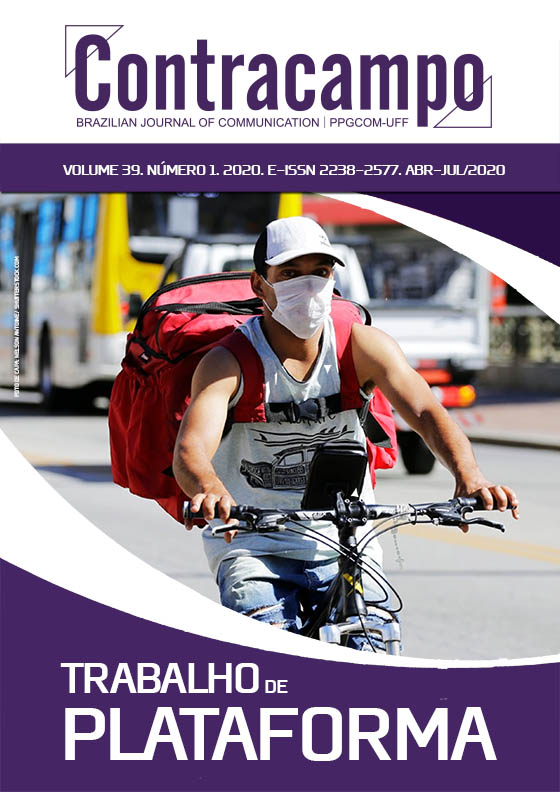The Algorithm Is Not My Boss Anymore: technological appropriation and (new) media strategies in Riders x Derechos and Mensakas
DOI:
https://doi.org/10.22409/contracampo.v39i1.38404Palabras clave:
Technological reappropiation, digital labor, Glovo, worker’s media representation, union new communication strategies.Resumen
This paper studies how a group of delivery workers in Barcelona were able to organize a successful traditional and a social media strategy in order to claim for their rights as wage workers. They created a union, RidersxDerechos, and they also decided to create a worker’s cooperative, Mensakas, with their own application and algorithm. We will study how they were able to re-appropriate technology and to use digital communities to spread alternative discourses. We have used different methodologies: traditional content analysis in Media, debate analysis in Social Media, qualitative ethnography. We noticed that RidersxDerechos access to media was very successful (300 piece of news analysed) thanks to strikes and court trials, facilitating a change of perspective in the treatment of platform economy in Media. Media were following up the digital entrepreneurship rhetoric until then. Along with the traditional media strategy they developed a diversified communicative pathway in social media (Twitter, Instagram, Facebook, and Goteo) that helped them to establish alliances with riders from other cities and countries. We focused on more than 25.000 tweets analysed. Finally, they proposed a new way to use technology by creating their own app and algorithms for their working cooperative, Mensakas. Crowdfunding were also used to fund it and to spread an alternative working storytelling from Silicon Valley’s.
Descargas
Referencias
Batista-Domínguez, R. C. (2018). Nuevas formas de empleo en la era de Economías
Colaborativas. Innovación tecnológica, v.24, nº 4. ISSN 1025-6054.
BOE (Boletín Oficial del Estado) (2019) Disposición 4645, Resolución de 19 de marzo de 2019, de la Dirección General de Trabajo, por la que se registran y publican los acuerdos de modificación y prórroga del V Acuerdo Laboral de ámbito estatal para el sector de Hostelería. 29/03/2019, pp: 32702-32712.
Briziarelli, M. (2018). Spatial politics in the digital realm: the logistics/precarity dialectics and Deliveroo’s tertiary space struggles. Cultural Studies, [Accessed April 20, 2019] DOI: 10.1080/09502386.2018.1519583
De Stefano,V. (2017). Labour is not a technology – Reasserting the Declaration of Philadelphia in Times of Platform-Work and Gig-Economy en IUSLabor, 2, p. 1-16.
Guerra, M.J. (2018). Hacia una teoría crítica de la precariedad. Gaceta sindical: reflexión y debate. nº 30. p. 95-108. ISSN 1133-035X.
Horkheimer, M. and Adorno, T. W. (2006). Dialéctica de la Ilustración: fragmentos filosóficos. Madrid: Trotta.
Jipson, J., Jithseeh, P.M. (2019) ‘ “There’s no such thing as Emancipatory Techonolgy”: Marxist Scholar David Harvey’The Wire. [Accessed February 12, 2019] https://thewire.in/economy/david-harvey-marxist-scholar-neo-liberalism
Morozov, E. (2018) Capitalismo big tech. ¿Welfare o neofeudalismo digital?. Madrid: Enclave.
Pérez-Chirinos, V. (2017). Lo que el caso Deliveroo puso sobre la mesa: autónomos y acción colectiva. Arxius de Ciències Socials, 2017, No. 36-37: 123
Rocha Sánchez, F. (2018). La intervención de los sindicatos de clase en la economía de plataformas. Anuario IET. Presente y futuro del trabajo. Vol 5, pp.77-94.
Rosenblat, A. (2018). Uberland. How algorithms are rewriting the rules of work. Oakland: University of California Press.
Ross, A. (2002) No collar. The humane workplace and its hidden costs. New York: Basic Books.
Reuters Institute (2018). Digital News Report 2018. Oxford University, Reuters Institute. [Accessed April 10, 2019] http://www.digitalnewsreport.org/
Scholtz, T. (2017). Uberworked and Underpaid. How workers are disrupting the digital economy. Cambridge: Polity.
Thompson, E. P. (2012). La formación de la clase obrera en Inglaterra. Madrid:Capitán Swing.
Warin, R., McCann, D. (2018). Who watches the workers? Power and accountability in digital economy. London: New Economics Foundation.
Interview to Núria Soto and Juanjo Lavergne, members of RidersxDerechos; 14/03/2019
Interview to Nacho Parra, Col·lectiu Ronda labour attorney; 20/03/2019
Descargas
Publicado
Número
Sección
Licencia
Os autores retêm os direitos autorais e concedem à revista o direito de publicar o seu trabalho pela primeira vez sob a licença Creative Commons (CC-BY), que permite o intercâmbio de obras e reconhecimento de autoria na revista.


